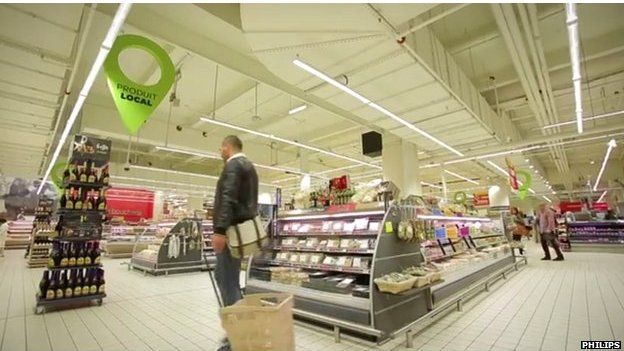Supermarket LED lights talk to smartphone app
- Published

French shoppers have become the first to experience a new LED lighting system that sends special offers and location data to their smartphones.
The technology was designed by Philips and has been installed at a Carrefour supermarket in Lille.
It transmits codes via light waves, which are undetectable to the eye but can be picked up by a phone camera.
The innovation offers an alternative to Bluetooth-based "beacons", which are being installed by many retailers.
"We are always on the lookout for innovations to facilitate customers' navigation," explained Carrefour executive Celine Martin.
"Thanks to this new application, which uses Philips technology, we are now able to provide our customers at the EuraLille Carrefour with a new service, enabling them to quickly search and locate their preferred promotions or detect all the promotions around them."
Philips said that an added benefit was that its system required 50% less electricity than the old lights it had replaced.
Philips is not the only organisation to have researched ways to transmit data via specialised LED bulbs.
Engineers at the University of Edinburgh are working on a "li-fi" system capable of transmitting data at up to 10 gigabits per second, which they suggest could offer an alternative to radio waves.
'GPS of the aisles'
The Philips scheme is more limited in its scope, but has the benefit of being ready for market.
It works by making each of the fitted LEDs transmit a distinct location code.
If users open a compatible app and let their smartphone camera look upwards, this can be used to determine their location - accurate to up to 1m - and the direction they are facing.
It functions in a similar way to GPS-based maps used outdoors, and compares favourably to wi-fi based location systems, which are typically accurate to only 3-5m.
Many retailers, however, are investing instead in beacons - small Bluetooth 4 transmitters that allow compatible apps to work out how far away a user is standing, but not their precise position.
Beacons have the benefit of being cheaper and potentially easier to try out than replacing a store's complete lighting system.
However, one expert saw the merits of Philips's alternative.
"You have to look at this as a long-term investment, but this is potentially an easier spend to swallow as you're not just betting on one thing - you still have a good lighting system," commented Chris Green, principal technology analyst at the Davies Murphy Group consultancy.
"It also goes far beyond what is achievable with the beacons.
"To try and get a similar effect you'd need so many of them that they would be awkward to deploy, plus you'd need to rely on users having a phone that not only supports the newer Bluetooth standard but also has it switched on.
"By contrast, this is up in the air, so easier to roll out."
- Published31 March 2015
- Published18 October 2013
- Published28 October 2013